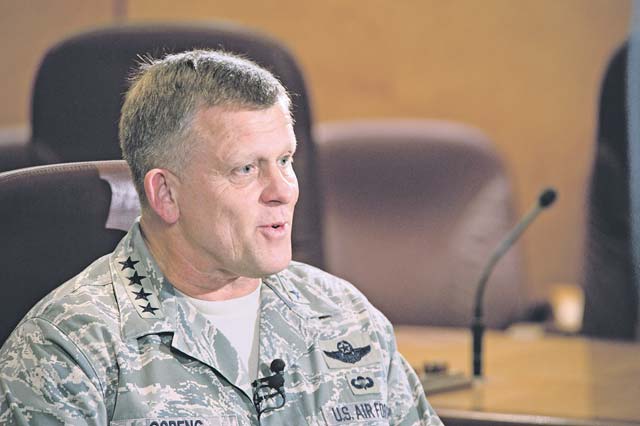
Gen. Frank Gorenc assumed command of U.S. Air Forces in Europe and
Air Forces Africa Aug. 2. He is responsible for Air Force activities in an area covering more than 19 million square miles.
Gen. Frank Gorenc shared his enthusiasm for becoming the new U.S. Air Forces in Europe and Air Forces Africa commander and spoke about challenges the command faces and how to overcome them in an interview Aug. 16 on Ramstein.
“I’m absolutely thrilled to be back in Europe,” said Gorenc, who left Ramstein in 2012 after serving as the 3rd Air Force commander. “I enjoyed my time at the Pentagon, but it made me realize that I’m back where I belong.”
Gorenc assumed command of USAFE-AFAFRICA Aug. 2. He is responsible for Air Force activities in an area covering more than 19 million square miles.
His previous position as the assistant vice chief of staff of the Air Force gave him a good perspective for facing challenges here.
“It elevated my knowledge of the holistic range of issues we have, beyond just warfighting,” Gorenc said.
“All of the decisions that were made at the strategic level in Washington manifest themselves at all of our main operating bases and all our geographically separated units. It’s interesting to go from that level to the actual execution of the mission. I can see what our intent is, and how it’s working in the field. I have a unique perspective on how we can make our mission here better.”
Gorenc touched on the topic of budgetary constraints and recognizes the force must become leaner.
“There is a fiscal crisis in the United States,” he said. “(Department of Defense) military spending will be part of the solution. As our resources go down, our requirement to fulfill the mission will not. The only way to make up the difference is to empower our Airmen to find ways to do the mission faster, cheaper or both.”
Gorenc echoed the Air Force chief of staff’s vision of “the world’s greatest Air Force powered by Airmen, fueled by innovation,” as how USAFE-AFAFRICA will overcome fiscal challenges, whether through technology, process or thought.
“It’s important to inspire the Airmen to contribute in a way that exponentially increases our capability,” Gorenc said.
“We have to continue to work on our people, make sure they have the training they need to do their work, the education, and then make sure that training and education is rounded off with the best on-the-job experience in a leadership role. We need to continue to develop and nurture the force that we need now, five years from now, and 20 years from now.”
Gorenc said this is not the first time there have been problems with budgets, changing environments and changes of strategy. He understands change may be discomforting, but it will always be there.
“If I want the Airmen of USAFE-AFAFRICA to remember anything,” he said, “when we are in the throes of change, the best way to manage it at any level is to trust your leadership, respect your peers and mentor your
subordinates, and I can guarantee you we are going to come out of whatever challenges we have in the next few years as a stronger force.”


